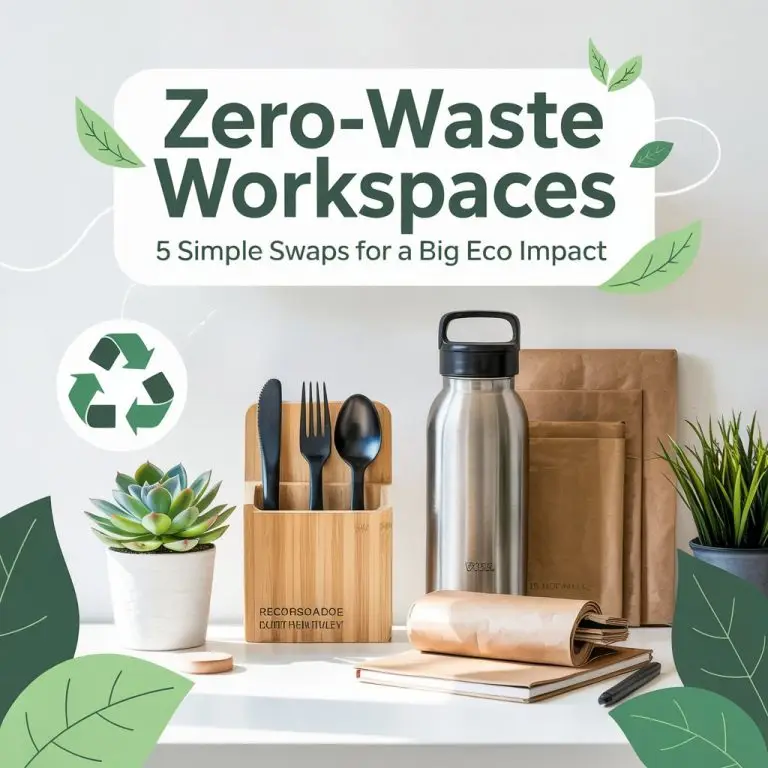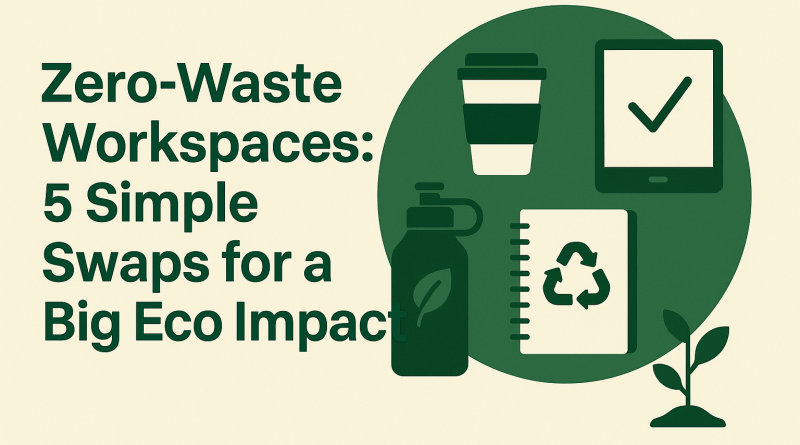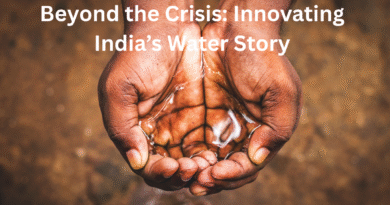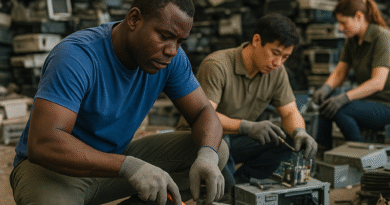Zero-Waste Workspaces: 5 Simple Swaps for a Big Eco Impact
Introduction
The zero-waste movement is more than a trend—it’s a necessity. As businesses worldwide face mounting pressure to adopt greener practices, creating a zero-waste workplace isn’t just a gesture of goodwill—it’s a strategic move. Organizations that embrace sustainability report higher employee satisfaction, improved brand reputation, and often, significant cost savings.
At Frame Innovative, we believe in redefining the way companies function by blending innovation with environmental responsibility. In this blog, we spotlight five simple yet powerful swaps any business can make to reduce their environmental footprint and build a zero-waste workplace that supports both people and planet.
The corporate world is one of the largest producers of commercial waste. Offices are often filled with disposable coffee cups, plastic packaging, paper waste, and outdated electronics. According to the World Bank, global waste is expected to grow by 70% by 2050 unless urgent action is taken.
Zero-waste workspaces aren’t just about recycling—they’re about rethinking our systems. From procurement to disposal, every stage presents opportunities to innovate. Whether you’re a startup or a Fortune 500 company, your workspace can be a catalyst for positive environmental change.

Swap #1: Replace Single-Use with Reusables
The Problem:
Every year, offices contribute to billions of single-use items ending up in landfills—from plastic cutlery to coffee cups and paper towels. These items, though convenient, have a large environmental cost.
The Swap:
Start with reusable kitchen and office supplies. Invest in:
Ceramic mugs instead of paper coffee cups
Reusable water bottles or branded thermoses for employees
Stainless steel utensils and durable dishware in office kitchens
Cloth napkins and reusable cleaning cloths instead of paper towels
Eco Impact:
A single employee who swaps disposable cups for a reusable mug can save over 500 cups a year. When multiplied across departments or entire organizations, the environmental savings are staggering.
Frame Innovative Tip:
Create a welcome kit for new employees with a branded reusable mug, utensils, and a bottle. It sets a tone of sustainability from day one.
Swap #2: Go Digital and Cut the Paper
The Problem:
Despite the digital age, paper waste remains a massive issue. Offices still rely heavily on printed reports, handouts, and memos. Paper manufacturing is a resource-intensive process that involves water, energy, and deforestation.
The Swap:
Embrace digital tools and platforms to minimize or eliminate the need for paper. Consider:
Digital contracts and e-signature services
Project management apps like Trello, Asana, or Notion
Cloud-based collaboration (Google Workspace, Microsoft Teams)
Digital HR onboarding and time-tracking systems
Eco Impact:
Going paperless saves not just trees but energy and waste disposal costs. Plus, it boosts efficiency and makes document management far easier.
Frame Innovative Tip:
Gamify the transition! Run a “Paper-Free Month” challenge, rewarding teams that cut down the most on printing.
Swap #3: Opt for Circular Office Supplies
The Problem:
Traditional office supplies—pens, binders, staplers, etc.—are typically made from virgin plastics or non-recyclable materials. Once they break or are used up, they go straight to landfills.
The Swap:
Switch to products designed for circularity. Look for:
Refillable pens and markers
Recycled paper and notebooks
Compostable or biodegradable supplies
Furniture made from reclaimed or upcycled materials
Partner with vendors who align with circular economy principles—those who offer take-back or recycling programs for office supplies.
Eco Impact:
Using circular supplies reduces demand for new resources and keeps waste in the loop rather than out of sight. It’s a way of thinking that values longevity and resourcefulness.
Frame Innovative Tip:
Set up an “Eco Station” in your office where employees can drop off used pens, batteries, or electronics for responsible recycling.
Swap #4: Rethink Office Snacks and Catering
The Problem:
Food-related waste—packaging, leftovers, and single-use containers—is a major contributor to office landfill output. Even the snacks and drinks we offer can carry hidden environmental costs.
The Swap:
Reimagine your office pantry and catering practices:
Buy snacks in bulk and store them in glass containers
Partner with local, sustainable food vendors
Encourage “bring your own container” policies for lunches
Compost food scraps with a local composting partner or on-site bin
Eco Impact:
Reducing food packaging waste and avoiding single-serve items cuts down significantly on plastic and cardboard waste. Plus, supporting local vendors strengthens your community’s economy.
Frame Innovative Tip:
Host a monthly “zero-waste lunch” where employees are challenged to bring waste-free meals—think bento boxes, glass jars, and cloth wraps.
Swap #5: Redesign Office Layouts for Sustainability
The Problem:
Workspace design can unintentionally encourage waste—from inefficient lighting to over-reliance on HVAC systems and unnecessary furniture turnover.
The Swap:
Integrate sustainability into your physical office design:
Use energy-efficient LED lighting and motion sensors
Invest in ergonomic, modular furniture that lasts
Choose carpets, paints, and décor that are non-toxic and sustainably sourced
Create green zones with plants that improve air quality and wellbeing
Consider flexible layouts that allow for shared desks, reducing the need for additional resources and square footage.
Eco Impact:
Smart design reduces energy consumption, supports employee wellness, and decreases waste generated from frequent office renovations or moves.
Frame Innovative Tip:
Invite your team to help redesign common spaces using second-hand or upcycled furniture. It builds engagement and reinforces sustainability values.
The Bigger Picture: Culture Over Checklists
It’s not just about what you swap—it’s about how you think.
A truly zero-waste office thrives when the culture supports it. Leadership buy-in, employee education, and open dialogue are crucial. Embed sustainability into company values, host eco-focused events, and reward green initiatives.
And remember: the journey to zero waste doesn’t require perfection. It requires consistency and creativity.
The Business Case for Zero-Waste Workspaces
Still wondering if all this is worth it? Let’s look at the business benefits:
Cost Savings: Reducing waste reduces costs—less spent on disposables, trash hauling, and energy.
Brand Reputation: Consumers and clients are increasingly eco-conscious. A zero-waste approach sets your company apart.
Employee Attraction & Retention: Today’s workforce—especially Millennials and Gen Z—value purpose-driven employers.
Regulatory Preparedness: As governments tighten environmental regulations, proactive companies will be ahead of the curve.
Innovation Mindset: Zero-waste thinking fuels innovation, which spills over into other areas of the business.
Trend Watch: The Future of Sustainable Workspaces
The workplace is evolving rapidly, and sustainability is at its core. Here are a few future-forward trends to watch:
Remote-first Sustainability: Eco policies are extending to home offices, with companies subsidizing energy-efficient equipment and digital tools.
Green Certifications: More businesses are aiming for LEED, B Corp, or WELL certifications to demonstrate their commitment.
Waste-as-a-Service: Startups are emerging that offer zero-waste office audits and subscription-based recycling or composting services.
AI + Sustainability: Smart systems are being used to track and optimize resource usage in real time, from lighting to food waste.
Frame Innovative is committed to staying ahead of these trends and helping businesses navigate them with agility and purpose.
Conclusion: Start Small, Think Big
The road to a zero-waste workplace isn’t paved with grand overhauls—it’s paved with small, intentional choices made every day. By making even a few of these five simple swaps, businesses can drastically cut waste, improve workplace culture, and lead the charge in environmental stewardship.
At Frame Innovative, we’re here to help companies create a future where sustainability is second nature—and innovation leaves no waste behind.
Are you ready to lead the change?
Stay tuned to the Frame Innovative blogs for more eco-smart solutions and the latest trends in sustainability, tech, and workplace innovation.





Great resource!